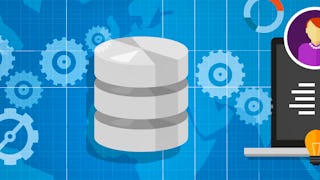Filter by
SubjectRequired
LanguageRequired
The language used throughout the course, in both instruction and assessments.
Learning ProductRequired
LevelRequired
DurationRequired
SkillsRequired
SubtitlesRequired
EducatorRequired
Explore the System Biology Course Catalog
 Status: Free Trial
Status: Free TrialRutgers the State University of New Jersey
Skills you'll gain: Lean Six Sigma, Lean Manufacturing, Process Improvement, Operations Management, Production Process, Six Sigma Methodology, Operational Efficiency, Quality Improvement, Kanban Principles, Continuous Improvement Process, Inventory Control, Inventory Management System
 Status: Free Trial
Status: Free TrialUniversity of California San Diego
Skills you'll gain: Big Data, Apache Hadoop, Scalability, Data Processing, Data Science, Distributed Computing, Unstructured Data, Data Analysis, Real Time Data, Data Storage
 Status: Free Trial
Status: Free TrialUniversity of Pennsylvania
Skills you'll gain: Operations Management, Operational Efficiency, Process Analysis, Process Improvement, Lean Methodologies, Workflow Management, Continuous Improvement Process, Capacity Planning, Quality Management, Supply Chain Management, Statistical Process Controls, Process Flow Diagrams, Resource Utilization, Root Cause Analysis
 Status: Free Trial
Status: Free TrialSkills you'll gain: Data Store, Extract, Transform, Load, Data Architecture, Data Pipelines, Big Data, Data Warehousing, Data Governance, Apache Hadoop, Relational Databases, Apache Spark, Data Lakes, Databases, SQL, NoSQL, Data Security
 Status: Free Trial
Status: Free TrialUniversity of Toronto
Skills you'll gain: ArcGIS, Spatial Data Analysis, Spatial Analysis, Geographic Information Systems, Geospatial Mapping, GIS Software, Data Mapping, Data Visualization, Metadata Management, Query Languages, Global Positioning Systems, Quantitative Research, Data Compilation, Data Modeling, Typography, Data Manipulation, Data Processing, Data Storytelling, Design Elements And Principles, Image Analysis
 Status: Free Trial
Status: Free TrialUniversity of California, Davis
Skills you'll gain: Key Performance Indicators (KPIs), Employee Coaching, Coaching, Gap Analysis, Management Training And Development, Performance Management, Performance Analysis, Expectation Management, Employee Performance Management, People Management, Leadership and Management, Performance Improvement, Accountability, Personal Development, Leadership Development, Meeting Facilitation, Constructive Feedback, Professional Development, Leadership, Employee Engagement
 Status: Free Trial
Status: Free TrialCase Western Reserve University
Skills you'll gain: Employee Coaching, Coaching, Negotiation, Emotional Intelligence, Empathy, Leadership Development, Compassion, Leadership, Organizational Change, Organizational Development, Organizational Leadership, Empowerment, Culture Transformation, Strategic Leadership, People Development, Active Listening, Personal Development, Drive Engagement, Professional Development, Leadership and Management

Yale University
Skills you'll gain: Systems Thinking, Strategic Leadership, Leadership, Team Leadership, Team Building, Professional Development, Action Oriented, Visionary, Time Management, Prioritization, Complex Problem Solving, Personal Development, Self-Awareness, Goal Setting, Communication

Universidad de los Andes
Skills you'll gain: Human Development, Child Development, Cultural Diversity, Sociology, Psychology, Patient Education And Counseling, Interpersonal Communications, Biology, Parent Communication
 Status: Free Trial
Status: Free TrialUniversity of Colorado System
Skills you'll gain: Vital Signs, Emergency Medical Services, Patient Evaluation, Medical History Documentation, Medical Terminology, Health Assessment, Emergency Medicine, Patient Preparation, Medical Emergency, Patient Safety, Anatomy, Safety Assurance, Stress Management

Skills you'll gain: Microsoft Azure, Cloud Services, Virtualization, Cloud Computing, Virtual Machines, Cloud Platforms, Cloud Storage, Cloud Infrastructure, Virtual Private Networks (VPN), Public Cloud, General Networking, Database Management Systems, Scalability
 Status: Free Trial
Status: Free TrialDeepLearning.AI
Skills you'll gain: Prompt Engineering, Large Language Modeling, Database Design, Software Documentation, Software Design Patterns, Database Systems, Collaborative Software, Software Testing, ChatGPT, Technical Documentation, Generative AI, Code Review, Software Architecture, System Design and Implementation, API Design, Dependency Analysis, Artificial Intelligence, Software Development Tools, Security Testing, Software Development
System Biology learners also search
In summary, here are 10 of our most popular system biology courses
- Supply Chain Operations: Rutgers the State University of New Jersey
- Introduction to Big Data: University of California San Diego
- Introduction to Operations Management: University of Pennsylvania
- Introduction to Data Engineering: IBM
- GIS, Mapping, and Spatial Analysis: University of Toronto
- Coaching Skills for Managers: University of California, Davis
- Inspired Leadership: Case Western Reserve University
- Connected Leadership: Yale University
- Sexualidad...mucho más que sexo: Universidad de los Andes
- EMT Foundations: University of Colorado System










